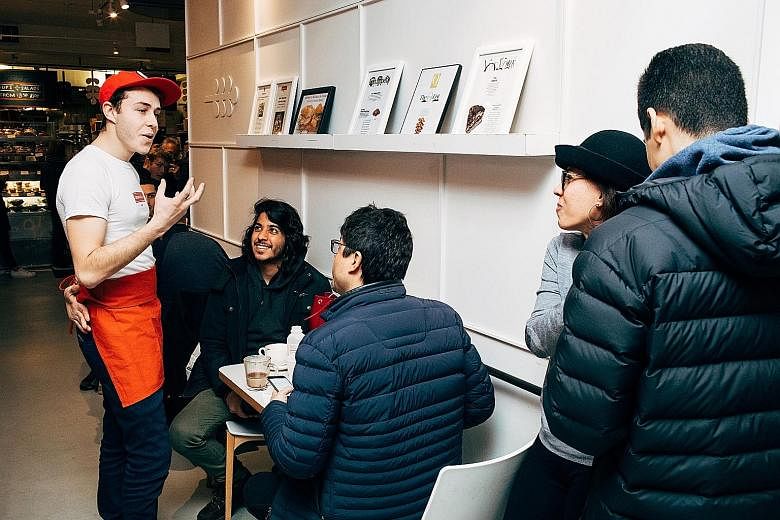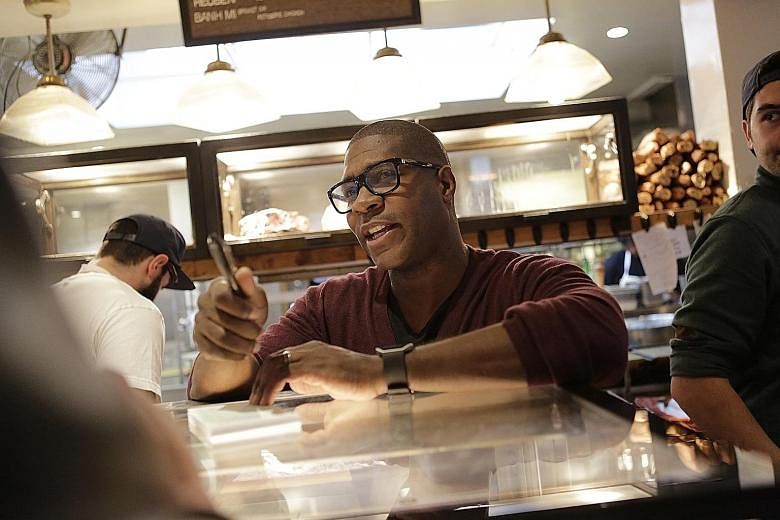NEW YORK • Fritz the Schmoozer has his eye on you from the moment you walk through the door. It is his job.
Fritz, born Jacob Fritz Oleshansky, is the host at Breads Bakery in New York's Union Square, where he relies on old-school skills such as eye contact and conversation to make customers feel welcome.
For years, so-called fast-casual restaurants have worked to lower costs by keeping the help behind the counter and adopting a cafeteria format that leaves much of the work to diners, who stand in line, order, pay and carry the food to a table or out the door.
But increasingly, many of these places are getting the message that customers crave a little more human contact. They have created a new class of employee, whose mission is to infiltrate the crowds to help, entertain, instruct or simply distract from the tedium of waiting.
Fast-casual restaurants are the quickest-growing segment of the dining business, combining speedy service with food that they claim is fresher and higher in quality than traditional fast food. And as they battle rising competition from a new source - delivery services - workers such as Mr Oleshansky are the first line of defence.
Between 8 and 9am, Mr Oleshansky says, he avoids any customer who is on the telephone or wearing earphones. "If I talk," he said, "I get in their way and make them late for work."
He is more voluble with tourists. "They're overwhelmed," he said. "They want to know, 'Is this self-service?' So I say, 'Yes, what are you looking for?' and then we're off."
When Breads Bakery opened in 2013, Mr Gadi Peleg, an owner, watched nervously as people walked in, looked around and walked out - or asked where the pastries came from, assuming that they were generic goods from a volume supplier. He realised that he needed a host to make that connection full-time.
"If you go to three places and they know your name at one of them, that's where you're coming back - you feel you belong," said Mr Oleshansky, 22, who started at Breads three months after graduating from Brandeis University.
A line manager works at Mr Zach Friedlander's Aloha Poke Co outlet in Revival Food Hall in Chicago. When it opened last autumn, the lunchtime line at the 23 sq m food stall was so long that customers bailed and neighbouring vendors complained about gridlock.
Mr Friedlander divided the line in two: an ordering line of 60 people and a second line of people waiting to get into the ordering line, with space for cross-traffic.
He also created the job of a line manager, a friendly gatekeeper for those in the second line. "Everyone lines up across the hall and keeps their eyes on him," Mr Friedlander said. "It's like Noah's ark. He waves them over two by two."
The line manager also hosts a trivia quiz for the first 15 people in the ordering line, with a free poke bowl for the winner.
"It might be five minutes - from the time you order to the time you pick up your bowl," Mr Friedlander said, "but we try to cultivate as much hospitality as possible."
Mr Travis Lett, chef and an owner of Gjusta, a fast-casual younger sibling of the acclaimed Gjelina restaurant in Venice, California, sells housemade pastries, bread as well as smoked and cured meats, displayed at a counter. When Gjusta opened two years ago, the counter help had trouble keeping up with what could be 2,500 orders on a busy day.
"I didn't quite anticipate how many questions there were going to be," Mr Lett said on people interested in the difference between fermented and yeast-raised breads, or between cold- and hot-smoked salmon - wild and farmed.
He decided to create "culinary liaisons, not just order takers". The counter staff has to study a homework packet, work alongside a more experienced employee and survive what Mr Lett calls "the arduous process of tasting and analysing their way through the menu", all of which takes weeks.
Seattle chef John Sundstrom recently opened Southpaw, a 50-seat pizzeria on the original site of his fine-dining restaurant, Lark, which has moved to bigger premises.
But he was worried that his regulars would be rattled by a more casual set-up. They were not accustomed to benches, communal tables and an ordering line.
So he created the "rover", an intermediary whose job is "to watch for your cues that you need something". If diners run out of wine before they run out of pizza, or vice versa, a rover steps up to the counter to fetch that second round.
Customers who order dessert get a chit from the cashier that they hand to a rover when they are ready. Guests can open a tab, so they pay only once when they are done.
NYTIMES


